Key Professional Conduct and Ethical Duties in Australian Law
VerifiedAdded on 2023/01/10
|6
|1445
|65
Essay
AI Summary
This essay provides a comprehensive overview of the professional conduct and ethical duties of lawyers in Australia. It begins by defining the legal profession and the importance of adhering to ethical standards and professional conduct obligations. The main body of the essay delves into the core ethical duties, including the duty to the court, the duty to obey the law, and the duty to the client. The essay explains the responsibilities associated with each duty, emphasizing the importance of honesty, respect, and competence. It also highlights the Australian Solicitors Conduct Rules and their role in guiding lawyer behavior. The essay concludes by summarizing the key points and reinforcing the significance of professional conduct in the legal field. The references include books, journals, and online resources to support the arguments presented.
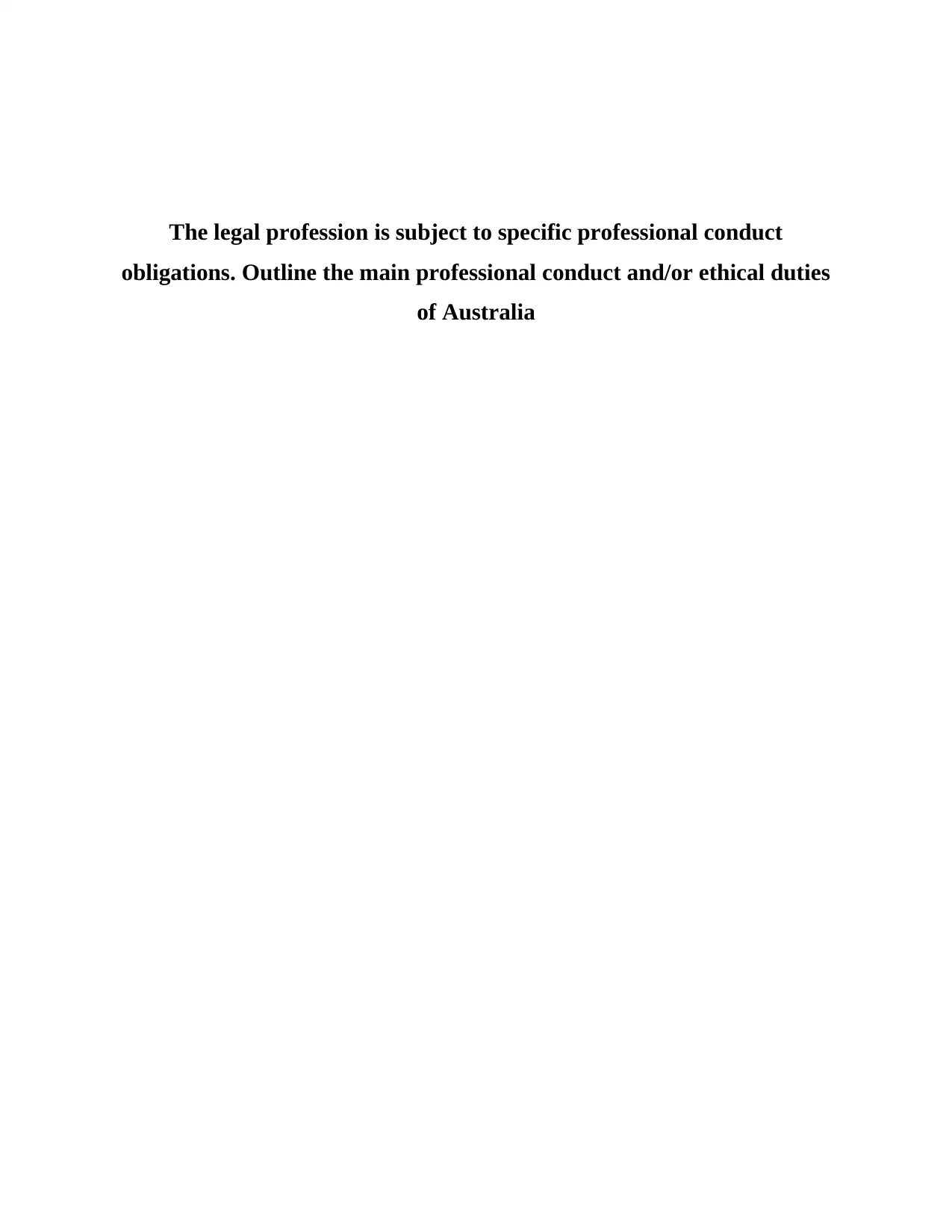
The legal profession is subject to specific professional conduct
obligations. Outline the main professional conduct and/or ethical duties
of Australia
obligations. Outline the main professional conduct and/or ethical duties
of Australia
Paraphrase This Document
Need a fresh take? Get an instant paraphrase of this document with our AI Paraphraser
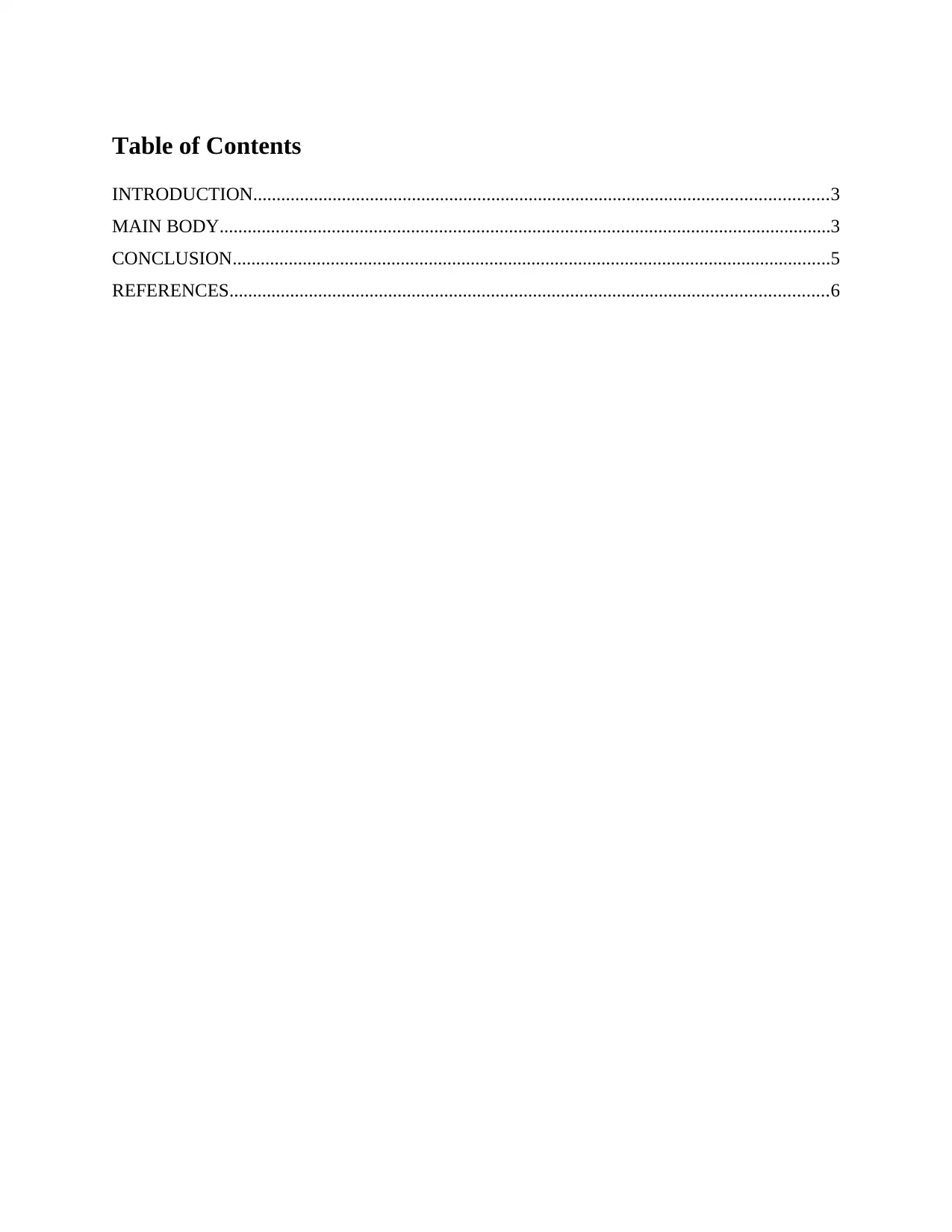
Table of Contents
INTRODUCTION...........................................................................................................................3
MAIN BODY...................................................................................................................................3
CONCLUSION................................................................................................................................5
REFERENCES................................................................................................................................6
INTRODUCTION...........................................................................................................................3
MAIN BODY...................................................................................................................................3
CONCLUSION................................................................................................................................5
REFERENCES................................................................................................................................6
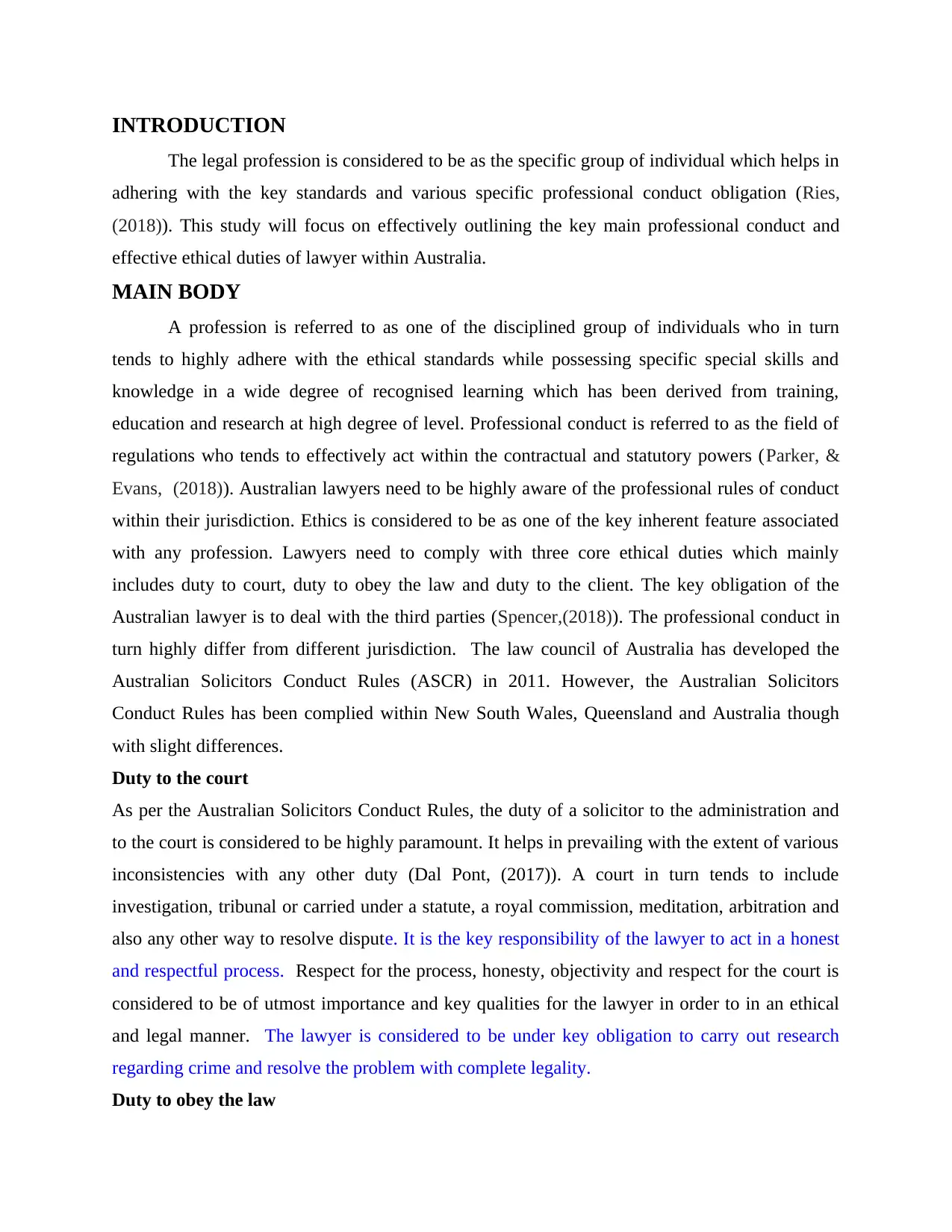
INTRODUCTION
The legal profession is considered to be as the specific group of individual which helps in
adhering with the key standards and various specific professional conduct obligation (Ries,
(2018)). This study will focus on effectively outlining the key main professional conduct and
effective ethical duties of lawyer within Australia.
MAIN BODY
A profession is referred to as one of the disciplined group of individuals who in turn
tends to highly adhere with the ethical standards while possessing specific special skills and
knowledge in a wide degree of recognised learning which has been derived from training,
education and research at high degree of level. Professional conduct is referred to as the field of
regulations who tends to effectively act within the contractual and statutory powers (Parker, &
Evans, (2018)). Australian lawyers need to be highly aware of the professional rules of conduct
within their jurisdiction. Ethics is considered to be as one of the key inherent feature associated
with any profession. Lawyers need to comply with three core ethical duties which mainly
includes duty to court, duty to obey the law and duty to the client. The key obligation of the
Australian lawyer is to deal with the third parties (Spencer,(2018)). The professional conduct in
turn highly differ from different jurisdiction. The law council of Australia has developed the
Australian Solicitors Conduct Rules (ASCR) in 2011. However, the Australian Solicitors
Conduct Rules has been complied within New South Wales, Queensland and Australia though
with slight differences.
Duty to the court
As per the Australian Solicitors Conduct Rules, the duty of a solicitor to the administration and
to the court is considered to be highly paramount. It helps in prevailing with the extent of various
inconsistencies with any other duty (Dal Pont, (2017)). A court in turn tends to include
investigation, tribunal or carried under a statute, a royal commission, meditation, arbitration and
also any other way to resolve dispute. It is the key responsibility of the lawyer to act in a honest
and respectful process. Respect for the process, honesty, objectivity and respect for the court is
considered to be of utmost importance and key qualities for the lawyer in order to in an ethical
and legal manner. The lawyer is considered to be under key obligation to carry out research
regarding crime and resolve the problem with complete legality.
Duty to obey the law
The legal profession is considered to be as the specific group of individual which helps in
adhering with the key standards and various specific professional conduct obligation (Ries,
(2018)). This study will focus on effectively outlining the key main professional conduct and
effective ethical duties of lawyer within Australia.
MAIN BODY
A profession is referred to as one of the disciplined group of individuals who in turn
tends to highly adhere with the ethical standards while possessing specific special skills and
knowledge in a wide degree of recognised learning which has been derived from training,
education and research at high degree of level. Professional conduct is referred to as the field of
regulations who tends to effectively act within the contractual and statutory powers (Parker, &
Evans, (2018)). Australian lawyers need to be highly aware of the professional rules of conduct
within their jurisdiction. Ethics is considered to be as one of the key inherent feature associated
with any profession. Lawyers need to comply with three core ethical duties which mainly
includes duty to court, duty to obey the law and duty to the client. The key obligation of the
Australian lawyer is to deal with the third parties (Spencer,(2018)). The professional conduct in
turn highly differ from different jurisdiction. The law council of Australia has developed the
Australian Solicitors Conduct Rules (ASCR) in 2011. However, the Australian Solicitors
Conduct Rules has been complied within New South Wales, Queensland and Australia though
with slight differences.
Duty to the court
As per the Australian Solicitors Conduct Rules, the duty of a solicitor to the administration and
to the court is considered to be highly paramount. It helps in prevailing with the extent of various
inconsistencies with any other duty (Dal Pont, (2017)). A court in turn tends to include
investigation, tribunal or carried under a statute, a royal commission, meditation, arbitration and
also any other way to resolve dispute. It is the key responsibility of the lawyer to act in a honest
and respectful process. Respect for the process, honesty, objectivity and respect for the court is
considered to be of utmost importance and key qualities for the lawyer in order to in an ethical
and legal manner. The lawyer is considered to be under key obligation to carry out research
regarding crime and resolve the problem with complete legality.
Duty to obey the law
⊘ This is a preview!⊘
Do you want full access?
Subscribe today to unlock all pages.

Trusted by 1+ million students worldwide
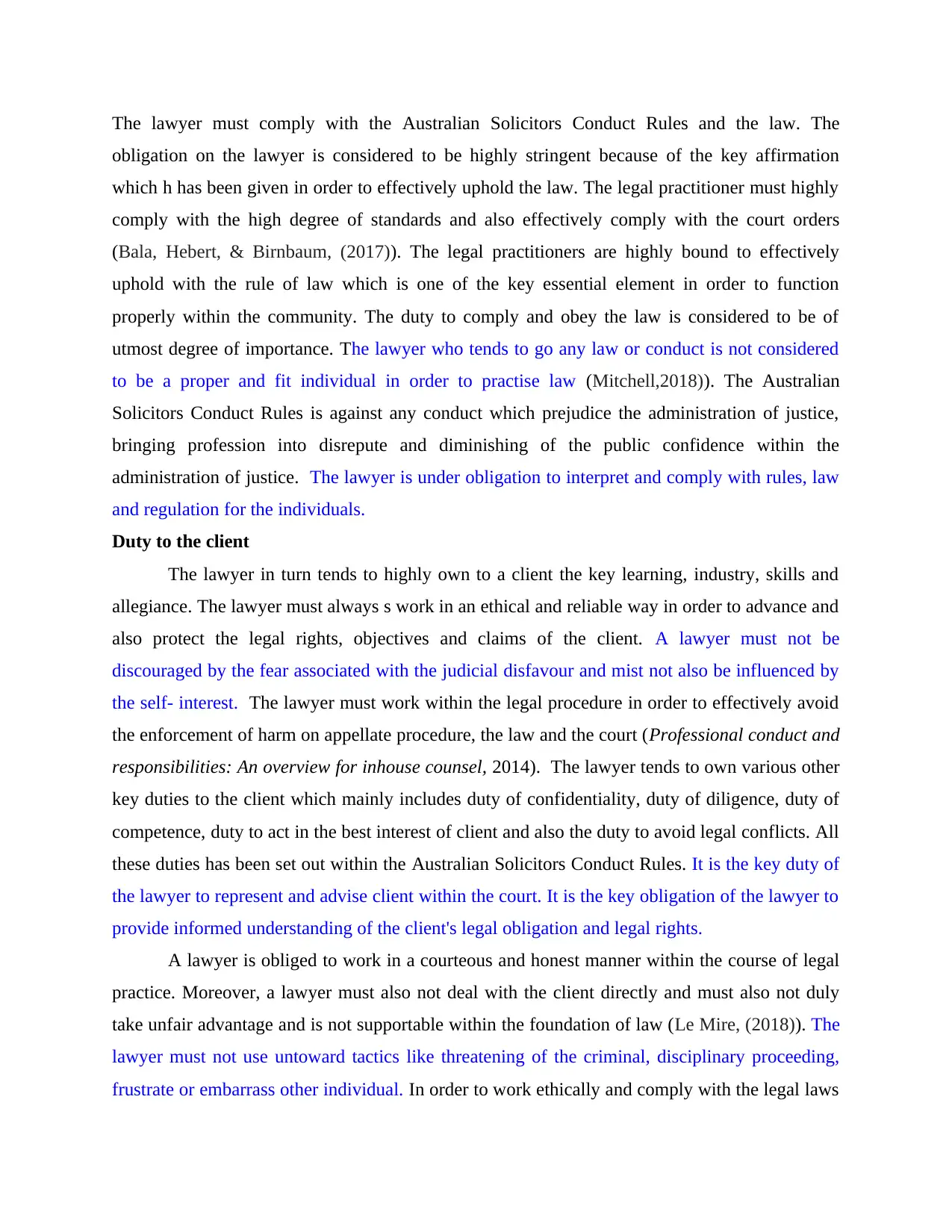
The lawyer must comply with the Australian Solicitors Conduct Rules and the law. The
obligation on the lawyer is considered to be highly stringent because of the key affirmation
which h has been given in order to effectively uphold the law. The legal practitioner must highly
comply with the high degree of standards and also effectively comply with the court orders
(Bala, Hebert, & Birnbaum, (2017)). The legal practitioners are highly bound to effectively
uphold with the rule of law which is one of the key essential element in order to function
properly within the community. The duty to comply and obey the law is considered to be of
utmost degree of importance. The lawyer who tends to go any law or conduct is not considered
to be a proper and fit individual in order to practise law (Mitchell,2018)). The Australian
Solicitors Conduct Rules is against any conduct which prejudice the administration of justice,
bringing profession into disrepute and diminishing of the public confidence within the
administration of justice. The lawyer is under obligation to interpret and comply with rules, law
and regulation for the individuals.
Duty to the client
The lawyer in turn tends to highly own to a client the key learning, industry, skills and
allegiance. The lawyer must always s work in an ethical and reliable way in order to advance and
also protect the legal rights, objectives and claims of the client. A lawyer must not be
discouraged by the fear associated with the judicial disfavour and mist not also be influenced by
the self- interest. The lawyer must work within the legal procedure in order to effectively avoid
the enforcement of harm on appellate procedure, the law and the court (Professional conduct and
responsibilities: An overview for inhouse counsel, 2014). The lawyer tends to own various other
key duties to the client which mainly includes duty of confidentiality, duty of diligence, duty of
competence, duty to act in the best interest of client and also the duty to avoid legal conflicts. All
these duties has been set out within the Australian Solicitors Conduct Rules. It is the key duty of
the lawyer to represent and advise client within the court. It is the key obligation of the lawyer to
provide informed understanding of the client's legal obligation and legal rights.
A lawyer is obliged to work in a courteous and honest manner within the course of legal
practice. Moreover, a lawyer must also not deal with the client directly and must also not duly
take unfair advantage and is not supportable within the foundation of law (Le Mire, (2018)). The
lawyer must not use untoward tactics like threatening of the criminal, disciplinary proceeding,
frustrate or embarrass other individual. In order to work ethically and comply with the legal laws
obligation on the lawyer is considered to be highly stringent because of the key affirmation
which h has been given in order to effectively uphold the law. The legal practitioner must highly
comply with the high degree of standards and also effectively comply with the court orders
(Bala, Hebert, & Birnbaum, (2017)). The legal practitioners are highly bound to effectively
uphold with the rule of law which is one of the key essential element in order to function
properly within the community. The duty to comply and obey the law is considered to be of
utmost degree of importance. The lawyer who tends to go any law or conduct is not considered
to be a proper and fit individual in order to practise law (Mitchell,2018)). The Australian
Solicitors Conduct Rules is against any conduct which prejudice the administration of justice,
bringing profession into disrepute and diminishing of the public confidence within the
administration of justice. The lawyer is under obligation to interpret and comply with rules, law
and regulation for the individuals.
Duty to the client
The lawyer in turn tends to highly own to a client the key learning, industry, skills and
allegiance. The lawyer must always s work in an ethical and reliable way in order to advance and
also protect the legal rights, objectives and claims of the client. A lawyer must not be
discouraged by the fear associated with the judicial disfavour and mist not also be influenced by
the self- interest. The lawyer must work within the legal procedure in order to effectively avoid
the enforcement of harm on appellate procedure, the law and the court (Professional conduct and
responsibilities: An overview for inhouse counsel, 2014). The lawyer tends to own various other
key duties to the client which mainly includes duty of confidentiality, duty of diligence, duty of
competence, duty to act in the best interest of client and also the duty to avoid legal conflicts. All
these duties has been set out within the Australian Solicitors Conduct Rules. It is the key duty of
the lawyer to represent and advise client within the court. It is the key obligation of the lawyer to
provide informed understanding of the client's legal obligation and legal rights.
A lawyer is obliged to work in a courteous and honest manner within the course of legal
practice. Moreover, a lawyer must also not deal with the client directly and must also not duly
take unfair advantage and is not supportable within the foundation of law (Le Mire, (2018)). The
lawyer must not use untoward tactics like threatening of the criminal, disciplinary proceeding,
frustrate or embarrass other individual. In order to work ethically and comply with the legal laws
Paraphrase This Document
Need a fresh take? Get an instant paraphrase of this document with our AI Paraphraser
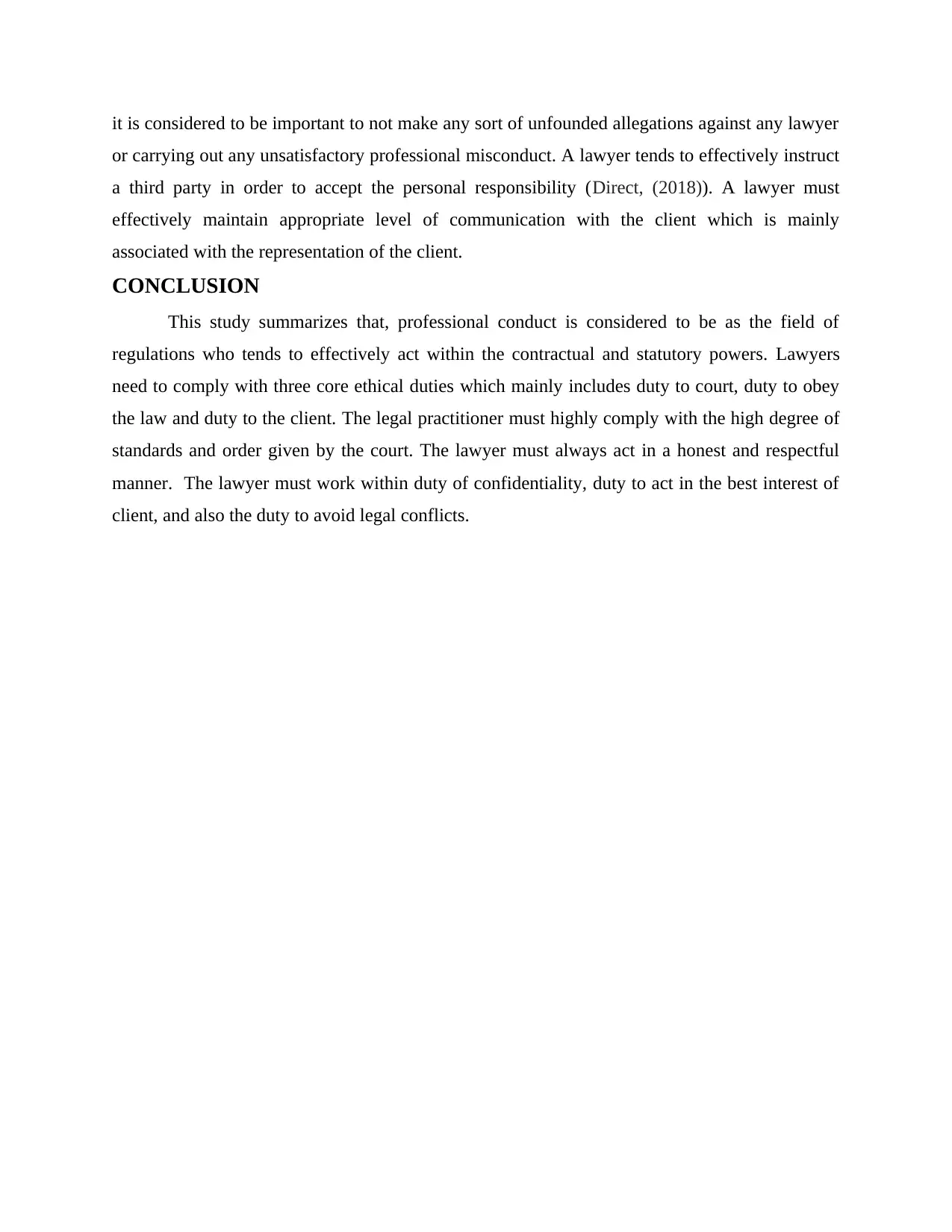
it is considered to be important to not make any sort of unfounded allegations against any lawyer
or carrying out any unsatisfactory professional misconduct. A lawyer tends to effectively instruct
a third party in order to accept the personal responsibility (Direct, (2018)). A lawyer must
effectively maintain appropriate level of communication with the client which is mainly
associated with the representation of the client.
CONCLUSION
This study summarizes that, professional conduct is considered to be as the field of
regulations who tends to effectively act within the contractual and statutory powers. Lawyers
need to comply with three core ethical duties which mainly includes duty to court, duty to obey
the law and duty to the client. The legal practitioner must highly comply with the high degree of
standards and order given by the court. The lawyer must always act in a honest and respectful
manner. The lawyer must work within duty of confidentiality, duty to act in the best interest of
client, and also the duty to avoid legal conflicts.
or carrying out any unsatisfactory professional misconduct. A lawyer tends to effectively instruct
a third party in order to accept the personal responsibility (Direct, (2018)). A lawyer must
effectively maintain appropriate level of communication with the client which is mainly
associated with the representation of the client.
CONCLUSION
This study summarizes that, professional conduct is considered to be as the field of
regulations who tends to effectively act within the contractual and statutory powers. Lawyers
need to comply with three core ethical duties which mainly includes duty to court, duty to obey
the law and duty to the client. The legal practitioner must highly comply with the high degree of
standards and order given by the court. The lawyer must always act in a honest and respectful
manner. The lawyer must work within duty of confidentiality, duty to act in the best interest of
client, and also the duty to avoid legal conflicts.
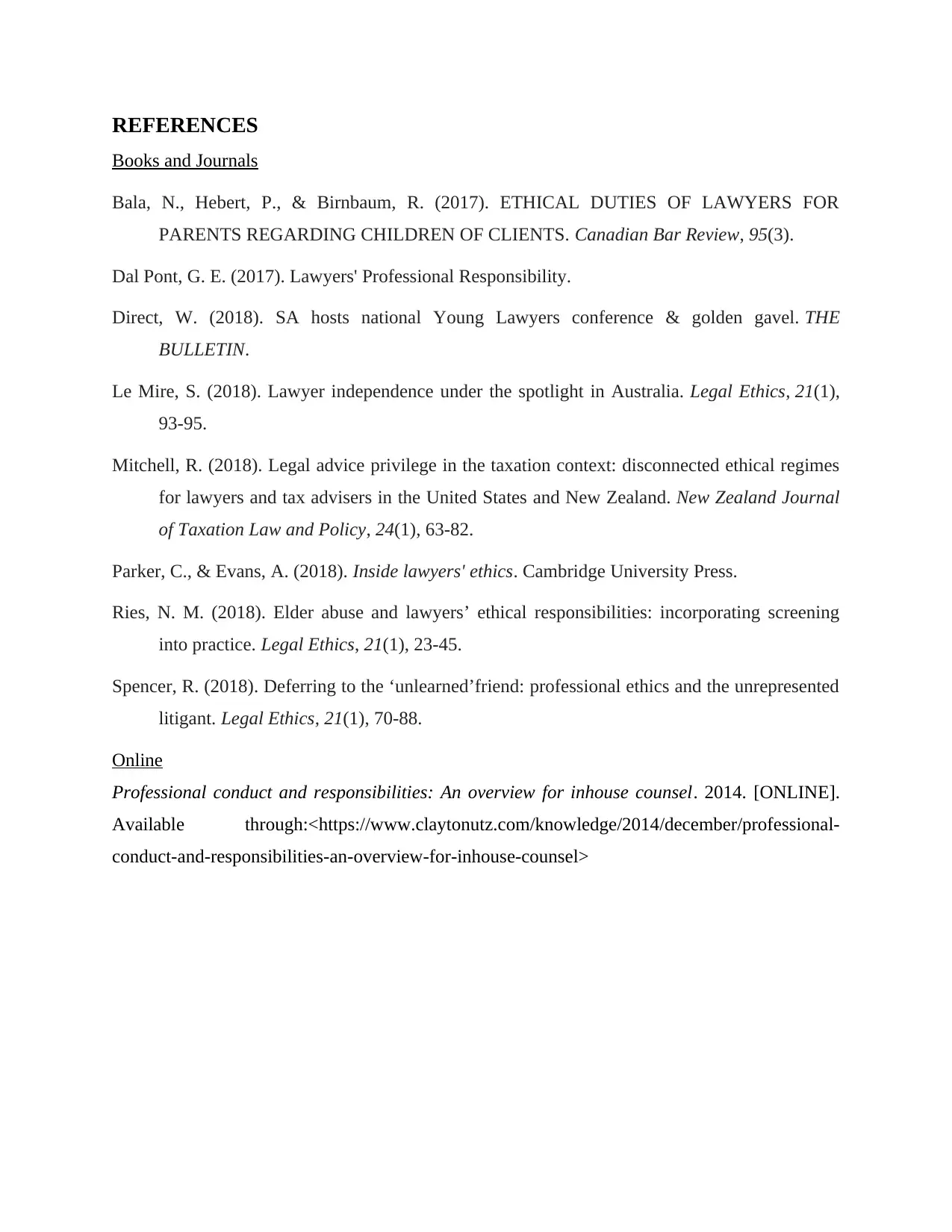
REFERENCES
Books and Journals
Bala, N., Hebert, P., & Birnbaum, R. (2017). ETHICAL DUTIES OF LAWYERS FOR
PARENTS REGARDING CHILDREN OF CLIENTS. Canadian Bar Review, 95(3).
Dal Pont, G. E. (2017). Lawyers' Professional Responsibility.
Direct, W. (2018). SA hosts national Young Lawyers conference & golden gavel. THE
BULLETIN.
Le Mire, S. (2018). Lawyer independence under the spotlight in Australia. Legal Ethics, 21(1),
93-95.
Mitchell, R. (2018). Legal advice privilege in the taxation context: disconnected ethical regimes
for lawyers and tax advisers in the United States and New Zealand. New Zealand Journal
of Taxation Law and Policy, 24(1), 63-82.
Parker, C., & Evans, A. (2018). Inside lawyers' ethics. Cambridge University Press.
Ries, N. M. (2018). Elder abuse and lawyers’ ethical responsibilities: incorporating screening
into practice. Legal Ethics, 21(1), 23-45.
Spencer, R. (2018). Deferring to the ‘unlearned’friend: professional ethics and the unrepresented
litigant. Legal Ethics, 21(1), 70-88.
Online
Professional conduct and responsibilities: An overview for inhouse counsel. 2014. [ONLINE].
Available through:<https://www.claytonutz.com/knowledge/2014/december/professional-
conduct-and-responsibilities-an-overview-for-inhouse-counsel>
Books and Journals
Bala, N., Hebert, P., & Birnbaum, R. (2017). ETHICAL DUTIES OF LAWYERS FOR
PARENTS REGARDING CHILDREN OF CLIENTS. Canadian Bar Review, 95(3).
Dal Pont, G. E. (2017). Lawyers' Professional Responsibility.
Direct, W. (2018). SA hosts national Young Lawyers conference & golden gavel. THE
BULLETIN.
Le Mire, S. (2018). Lawyer independence under the spotlight in Australia. Legal Ethics, 21(1),
93-95.
Mitchell, R. (2018). Legal advice privilege in the taxation context: disconnected ethical regimes
for lawyers and tax advisers in the United States and New Zealand. New Zealand Journal
of Taxation Law and Policy, 24(1), 63-82.
Parker, C., & Evans, A. (2018). Inside lawyers' ethics. Cambridge University Press.
Ries, N. M. (2018). Elder abuse and lawyers’ ethical responsibilities: incorporating screening
into practice. Legal Ethics, 21(1), 23-45.
Spencer, R. (2018). Deferring to the ‘unlearned’friend: professional ethics and the unrepresented
litigant. Legal Ethics, 21(1), 70-88.
Online
Professional conduct and responsibilities: An overview for inhouse counsel. 2014. [ONLINE].
Available through:<https://www.claytonutz.com/knowledge/2014/december/professional-
conduct-and-responsibilities-an-overview-for-inhouse-counsel>
⊘ This is a preview!⊘
Do you want full access?
Subscribe today to unlock all pages.

Trusted by 1+ million students worldwide
1 out of 6
Related Documents
Your All-in-One AI-Powered Toolkit for Academic Success.
+13062052269
info@desklib.com
Available 24*7 on WhatsApp / Email
![[object Object]](/_next/static/media/star-bottom.7253800d.svg)
Unlock your academic potential
Copyright © 2020–2026 A2Z Services. All Rights Reserved. Developed and managed by ZUCOL.





